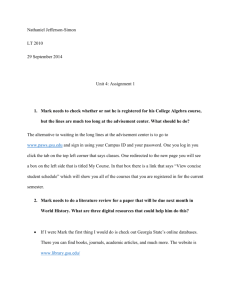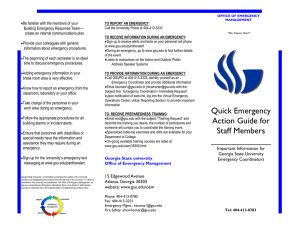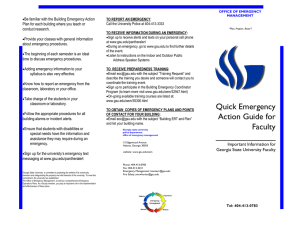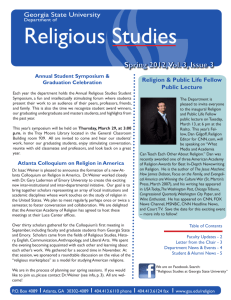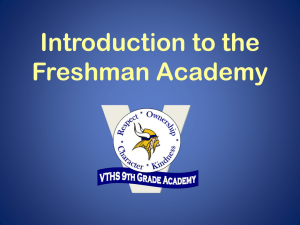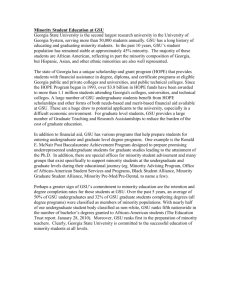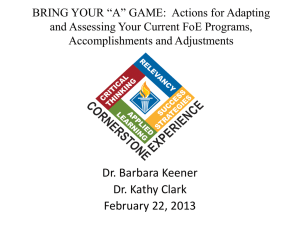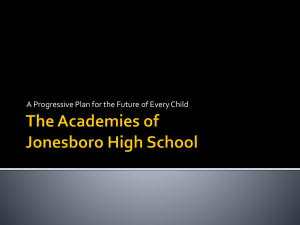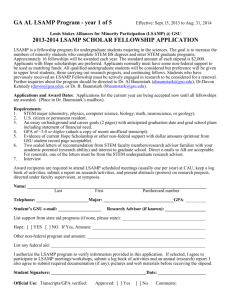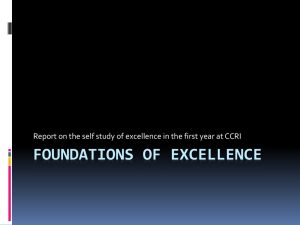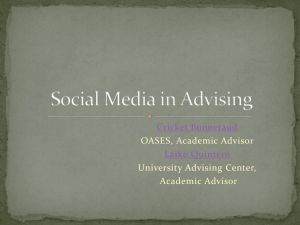C267-H01
advertisement
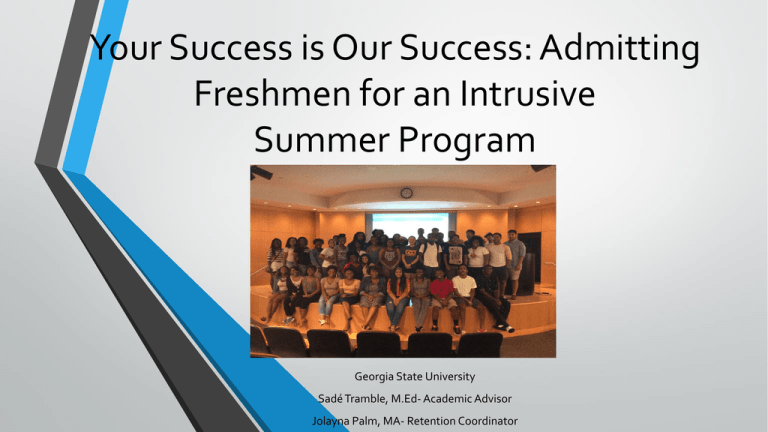
Your Success is Our Success: Admitting Freshmen for an Intrusive Summer Program Georgia State University Sadé Tramble, M.Ed- Academic Advisor Jolayna Palm, MA- Retention Coordinator Outline • About Georgia State University • Overview of Success Academy Program • Theory to Practice • Advisement • Data • Future Ideas About Georgia State University • Major Public Research Institution • 32,000+ students • Downtown Atlanta • Open campus environment • Campus diversity University Advisement Center • University Advisement Center • • Freshmen, 0-29 credit hours Sophomore/Junior, 30-89 credit hours • Offices of Academic Assistance (5 colleges) • Seniors, 90+ credit hours • All students, no assigned credit hours • UAC Transition Office First-Year Programs • • • • • • • • • • Freshmen Learning Communities Academic Coaching iCare/Early Alert First-Year Book Program Scholarship Resource Center Success Workshops Supplemental Instruction Latino Student Services and Outreach Success Academy Program Panther Excellence Program Success Academy Program Overview • • Established in April 2012 Freshmen Index • • • • Not “Conditionally” Admitted Accepted Class Numbers Planning Committee Members Freshmen Learning Community • • • • • Peer Mentors Early Alert Supplemental Instruction Leadership and Social Development Required Study Hours Planning Committee Members • • • • First-Year Programs University Advisement Center, Freshmen Office University Housing Office of Undergraduate Admissions Accepted Success Academy Students • Students are invited to participate in Success Academy based upon their Freshman Index (FI) score • • Georgia State uses the (FI) score to determine admissions to the university. The FI is based on a combination of SAT/ACT scores and high school GPA in college prep courses. Accepted Georgia State Students Admissions Matrix Honors Regular Admissions (Fall Term) Regular Admissions-Success Academy (Summer Term) Denied Welcome Receptions and Orientation • • • • Department Meet & Greet Presentations Advisor Role One-On-One Financial Aid Consultations Benefits of Program • Retention rate higher than other first-year students • Connect to faculty and staff • Earn credit prior to the fall semester • Learn to successfully navigate campus • Adjust to academic rigor of college prior to full-time fall schedule Freshmen Learning Community • • • Cohorts of 25 first-year students registered for common courses Core curriculum courses GSU 1010 • Academic support and success skills • University resources • Introduction to major • Peer Mentor Student Responsibility/Expectations • Be fully present for each class session and fully engage in the learning process • Communicate concerns that may interfere with the learning process • Attend related programming • Adhere to Student Code of Conduct Academic Requirements • • • • • Maximum summer course load = 7 credit hours Maximum fall/spring course load = 13 credit hours (12 credit hours is full-time status) Must maintain a minimum 2.5 GPA • <2.5 GPA after grades post • Maximum fall/spring course load = 11 credits Summer • • • GSU 1010- New Student Orientation (1 credit hour) ENGL 1101- English Composition I (3 credit hours) HIST 2110 or POLS 1101- Survey of U.S. History or American Government (3 credit hours) Fall • • • ENGL 1102- English Composition II (3 credit hours) HIST 2110 or POLS 1101- Survey of U.S. History or American Government (3 credit hours) Math course from core (3-4 credit hours) Applying Theory to Practice • Proactive (Intrusive) Advising • • • • Introduced Early Attend Award Ceremonies Active Engagement Early Intervention Academic Advising Mandatory Advisement • • • • Occur in GSU 1010 class Review of Core Curriculum How to register Registration restrictions In-Office Advising • • • Required as part of GSU 1010 class Major specific requirements Meet with assigned advisor Best Practices Current Practices • • • Added mandatory study hours for Fall 2014 semester Future Recommendations • • Academic Recovery Plan Spring 2015 class schedule • Changes to MA sessions during summer Re-implementing Friday connection programs during summer Study abroad component in Summer 2016 Testimonials • “Participating in Success Academy helped me get ahead academically. I was able establish a strong GPA in the summer that led to my academic success during the fall ” Success Academy Student 2013 • “The academic workshops, support from program staff, and resources provided by the Success Academy Program helped me to transition into college.” Success Academy Student 2014 Sources Georgia State University Office of Institutional Research. (2014). Common Data Set 2013-14 [2014]. Retrieved from http://oie.gsu.edu/institutionalresearch/institutional-data-2/common-data-2012-2013/. Varney, J. (2012, September). Proactive (Intrusive) Advising! Academic Advising Today, 35(3). Retrieved from http://www.nacada.ksu.edu/Resources/ Academic-Advising-Today/View-Articles/Proactive-(Intrusive)Advising!.aspx#sthash.q7V8UMth.dpuf. Contact Information • • • • • Sadé Tramble Academic Advisor II GSU University Advisement Center 404-413-2300 stramble@gsu.edu • • • • • Jolayna Palm Retention Coordinator GSU First-Year Programs 404-413-2052 jpalm@gsu.edu
